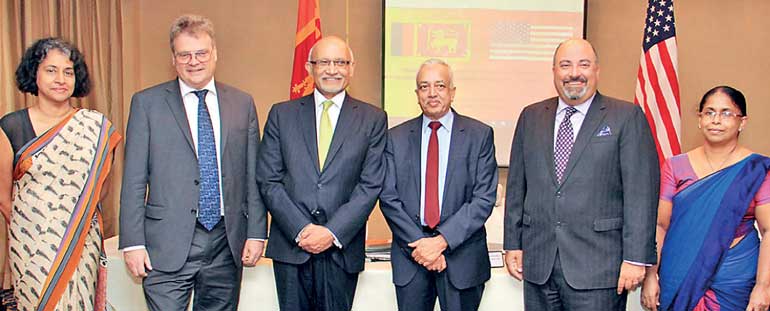Tuesday Jul 01, 2025
Tuesday Jul 01, 2025
Friday, 2 September 2016 00:15 - - {{hitsCtrl.values.hits}}
 Assistant US Trade Representative for South Asia Michael Delaney (second from left) along with Minister of Development Strategies and International Trade Malik Samarawickrema, US Assistant Secretary of Commerce for Global Markets Arun Kumar and Ambassador Atul Keshap
Assistant US Trade Representative for South Asia Michael Delaney (second from left) along with Minister of Development Strategies and International Trade Malik Samarawickrema, US Assistant Secretary of Commerce for Global Markets Arun Kumar and Ambassador Atul Keshap
Visiting Assistant US Trade Representative for South Asia, Michael Delaney, lamented over Sri Lanka’s declining external trade while speaking at the US-Sri Lanka Trade and Investment Framework (TIFA) intersessional meeting yesterday.
The following are excerpts of his speech.
Good Morning. I want to thank the Government of Sri Lanka, particularly the Minister of Development Strategies and International Trade, Honourable Malik Samarawickrama for hosting this intersessional meeting today.
As a relatively small island economy, Sri Lanka’s economy depends, to a considerable extent, on international external trade. As has been mentioned, the US has been Sri Lanka’s largest trading partner. Sri Lanka’s trade with the US is the important bedrock of the economy, accounting for many thousands of jobs across the island.
The overall trade performance of Sri Lanka has been in decline for some time. One common way of measuring a country’s external trade performance is to measure the volume of external trade with the GDP of the economy over time. If you do that with Sri Lanka you will find that the share of external trade as a percentage or portion of the overall Sri Lankan economy has been in decline. In fact it has declined quite precipitously over the past couple of decades.
Now this decline is especially concerning given the urgent task of national reconciliation. It is axiomatic that if you want a liberal society you need a growing economic pie. While I don’t reduce everything to economics, I do firmly believe that the task of national reconciliation will be made much easier in an environment characterised by rapid economic growth and job creation.
Conversely, the task of national reconciliation will be all the more challenging in the environment of stagnant or even declining growth and employment prospects.
The main objective of our joint action plan is to reverse the unfavourable trade trends that I set aside earlier. We aim to progressively eliminate the various legal and policy obstacles to greater trade and investment in Sri Lanka. We think we know what those obstacles are, we want to sideline them.
A 21st century internationally and regionally integrated economy allows goods, services, and people to move expeditiously in and out of the country. We aim to grow the role of external trade and investment and in the process we aim to create jobs and prosperity for the people of Sri Lanka. That’s what this exercise, what we’ve been going through, what we’re doing today, that’s what this is all about.
I’m no stranger to Sri Lanka. I have been here many times; I’ve been coming here for decades. I recognise that most Sri Lankans value their families above all else. People for the most part, work for their children. They work in the hope that their children will have a better life than they had.
The idea logs in my observation are idea logs that are few in number. So I firmly believe that if Sri Lankan leaders can create an enabling economic environment for growth and prosperity and jobs, good jobs for all, I’m very confident that all will be well. Thank you Mr. Minister Malik Samarawickrama. Thank you.
Discover Kapruka, the leading online shopping platform in Sri Lanka, where you can conveniently send Gifts and Flowers to your loved ones for any event including Valentine ’s Day. Explore a wide range of popular Shopping Categories on Kapruka, including Toys, Groceries, Electronics, Birthday Cakes, Fruits, Chocolates, Flower Bouquets, Clothing, Watches, Lingerie, Gift Sets and Jewellery. Also if you’re interested in selling with Kapruka, Partner Central by Kapruka is the best solution to start with. Moreover, through Kapruka Global Shop, you can also enjoy the convenience of purchasing products from renowned platforms like Amazon and eBay and have them delivered to Sri Lanka.
Discover Kapruka, the leading online shopping platform in Sri Lanka, where you can conveniently send Gifts and Flowers to your loved ones for any event including Valentine ’s Day. Explore a wide range of popular Shopping Categories on Kapruka, including Toys, Groceries, Electronics, Birthday Cakes, Fruits, Chocolates, Flower Bouquets, Clothing, Watches, Lingerie, Gift Sets and Jewellery. Also if you’re interested in selling with Kapruka, Partner Central by Kapruka is the best solution to start with. Moreover, through Kapruka Global Shop, you can also enjoy the convenience of purchasing products from renowned platforms like Amazon and eBay and have them delivered to Sri Lanka.